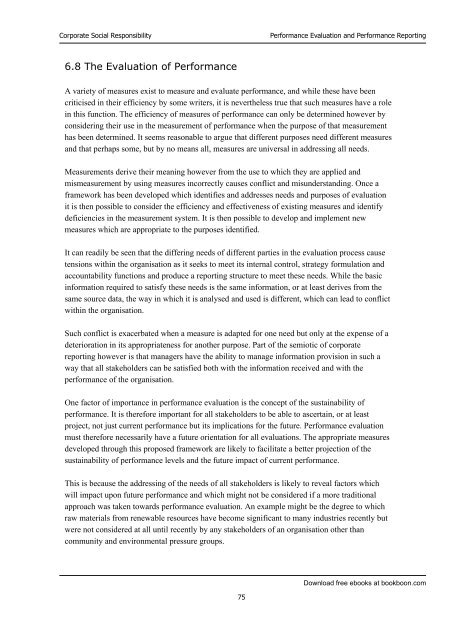Defining Corporate Social Responsibility - Tutorsindia
Defining Corporate Social Responsibility - Tutorsindia
Defining Corporate Social Responsibility - Tutorsindia
Create successful ePaper yourself
Turn your PDF publications into a flip-book with our unique Google optimized e-Paper software.
<strong>Corporate</strong> <strong>Social</strong> <strong>Responsibility</strong><br />
Performance Evaluation and Performance Reporting<br />
6.8 The Evaluation of Performance<br />
A variety of measures exist to measure and evaluate performance, and while these have been<br />
criticised in their efficiency by some writers, it is nevertheless true that such measures have a role<br />
in this function. The efficiency of measures of performance can only be determined however by<br />
considering their use in the measurement of performance when the purpose of that measurement<br />
has been determined. It seems reasonable to argue that different purposes need different measures<br />
and that perhaps some, but by no means all, measures are universal in addressing all needs.<br />
Measurements derive their meaning however from the use to which they are applied and<br />
mismeasurement by using measures incorrectly causes conflict and misunderstanding. Once a<br />
framework has been developed which identifies and addresses needs and purposes of evaluation<br />
it is then possible to consider the efficiency and effectiveness of existing measures and identify<br />
deficiencies in the measurement system. It is then possible to develop and implement new<br />
measures which are appropriate to the purposes identified.<br />
It can readily be seen that the differing needs of different parties in the evaluation process cause<br />
tensions within the organisation as it seeks to meet its internal control, strategy formulation and<br />
accountability functions and produce a reporting structure to meet these needs. While the basic<br />
information required to satisfy these needs is the same information, or at least derives from the<br />
same source data, the way in which it is analysed and used is different, which can lead to conflict<br />
within the organisation.<br />
Such conflict is exacerbated when a measure is adapted for one need but only at the expense of a<br />
deterioration in its appropriateness for another purpose. Part of the semiotic of corporate<br />
reporting however is that managers have the ability to manage information provision in such a<br />
way that all stakeholders can be satisfied both with the information received and with the<br />
performance of the organisation.<br />
One factor of importance in performance evaluation is the concept of the sustainability of<br />
performance. It is therefore important for all stakeholders to be able to ascertain, or at least<br />
project, not just current performance but its implications for the future. Performance evaluation<br />
must therefore necessarily have a future orientation for all evaluations. The appropriate measures<br />
developed through this proposed framework are likely to facilitate a better projection of the<br />
sustainability of performance levels and the future impact of current performance.<br />
This is because the addressing of the needs of all stakeholders is likely to reveal factors which<br />
will impact upon future performance and which might not be considered if a more traditional<br />
approach was taken towards performance evaluation. An example might be the degree to which<br />
raw materials from renewable resources have become significant to many industries recently but<br />
were not considered at all until recently by any stakeholders of an organisation other than<br />
community and environmental pressure groups.<br />
75<br />
Download free ebooks at bookboon.com
















